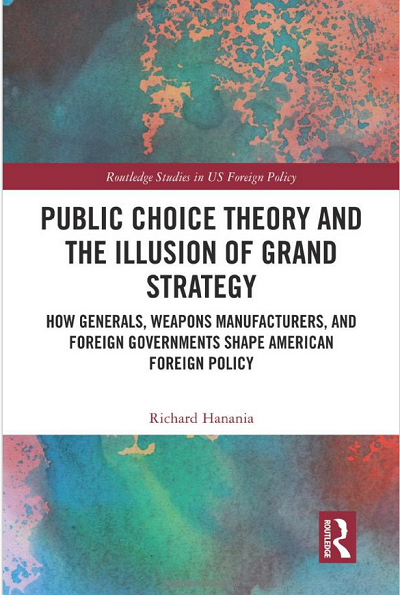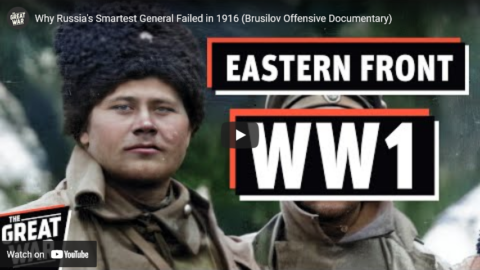One of the readers of Scott Alexander’s Astral Codex Ten has contributed a review of Public Choice Theory and the Illusion of Grand Strategy by Richard Hanania. This is one of perhaps a dozen or so anonymous reviews that Scott publishes every year with the readers voting for the best review and the names of the contributors withheld until after the voting is finished:
[In Public Choice Theory And The Illusion Of Grand Strategy], Richard Hanania details how a public choice model (imported from public choice theory in economics) can explain the United States’ incoherent foreign policy much better than the unitary actor model (imported from rational choice theory in economics) that underlies the illusion of American grand strategy in international relations (IR), in particular the dominant school of realism. As the subtitle “How Generals, Weapons Manufacturers, and Foreign Governments Shape American Foreign Policy” suggests, American foreign policy is driven by special interest groups, which results in millions of deaths for no good reason.
In the unitary actor model, the primary unit of analysis of inter-state relations is the state as a monolithic agent capable of making rational decisions (forming coherent, long-term “grand strategy”) from cost-benefit analysis based on preference ranking and expected “national interest” maximisation.
In the public choice model, small special-interest groups that reap a large proportion of the benefits from a policy (concentrated interests) are much more incentivised to lobby for a policy than the general public who pay for a negligible portion of the cost of the policy (diffused interests) are incentivised to lobby against. The former can coordinate much easier than the latter that has to overcome rational ignorance (the cost of educating oneself about foreign policy outweighs any benefit an one can expect to gain as individual citizens cannot affect foreign policy) and the society-wide collective action problem (irrational for every citizen to cooperate in the prisoner’s dilemma especially if individual gain is negligible) resulting in inefficient (not-public-good-maximising) policymaking i.e. government failure.
And more specifically on the use of Public Choice Theory:
Public choice theory was developed to understand domestic politics, but Hanania argues that public choice is actually even more useful in understanding foreign policy.
First, national defence is “the quintessential public good” in that the taxpayers who pay for “national security” compose a diffuse interest group, while those who profit from it form concentrated interests. This calls into question the assumption that American national security is directly proportional to its military spending (America spends more on defence than most of the rest of the world combined).
Second, the public is ignorant of foreign affairs, so those who control the flow of information have excess influence. Even politicians and bureaucrats are ignorant, for example most(!) counterterrorism officials — the chief of the FBI’s national security branch and a seven-term congressman then serving as the vice chairman of a House intelligence subcommittee, did not know the difference between Sunnis and Shiites. The same favoured interests exert influence at all levels of society, including at the top, for example intelligence agencies are discounted if they contradict what leaders think they know through personal contacts and publicly available material, as was the case in the run-up to the Iraq War.
Third, unlike policy areas like education, it is legitimate for governments to declare certain foreign affairs information to be classified i.e. the public has no right to know. Top officials leaking classified information to the press is normal practice, so they can be extremely selective in manipulating public knowledge.
Fourth, it’s difficult to know who possesses genuine expertise, so foreign policy discourse is prone to capture by special interests. History runs only once — the cause and effect in foreign policy are hard to generalise into measurable forecasts; as demonstrated by Tetlock’s superforecasters, geopolitical experts are worse than informed laymen at predicting world events. Unlike those who have fought the tobacco companies that denied the harms of smoking, or oil companies that denied global warming, the opponents of interventionists may never be able to muster evidence clear enough to win against those in power with special interests backing.
Hanania’s special interest groups are the usual suspects: government contractors (weapons manufacturers [1]), the national security establishment (the Pentagon [2]), and foreign governments [3] (not limited to electoral intervention).
What doesn’t have comparable influence is business interests as argued by IR theorists. Unlike weapons manufacturers, other business interests have to overcome the collective action problem, especially when some businesses benefit from protectionism. By interfering in a foreign state, the US may build a stable capitalist system propitious for multinationals, but can conversely cause a greater degree of instability and make it impossible to do business there; when business interests are unsure what the impact of a foreign policy will be for their bottom line, they should be more likely to focus their lobbying efforts elsewhere.








